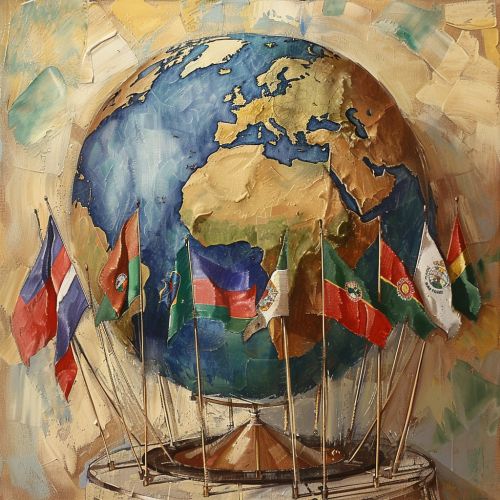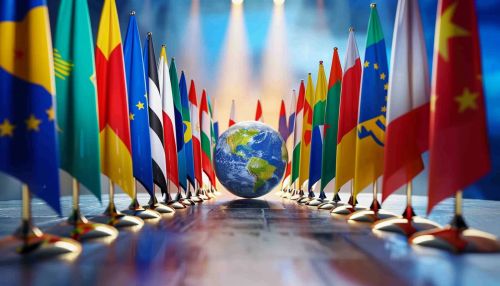Realism (international relations)
Introduction
Realism in international relations is a theoretical framework that emphasizes the competitive and conflictual side of international politics. It is grounded in the belief that the international system is anarchic, meaning there is no overarching authority above states. States are the principal actors in international relations and are primarily concerned with their own survival and power. Realism assumes that states act rationally and prioritize their national interest, often defined in terms of power.
Historical Development
Classical Realism
Classical realism traces its roots to ancient political thought, particularly the works of Thucydides, Niccolò Machiavelli, and Thomas Hobbes. Thucydides' account of the Peloponnesian War highlights the inevitability of conflict between states due to human nature and the pursuit of power. Machiavelli's "The Prince" underscores the pragmatic and often ruthless measures leaders must take to secure their state. Hobbes' "Leviathan" describes the state of nature as a "war of all against all," necessitating a powerful sovereign to maintain order.
Neorealism
Neorealism, also known as structural realism, was developed by Kenneth Waltz in his seminal work "Theory of International Politics" (1979). Unlike classical realism, which focuses on human nature, neorealism emphasizes the anarchic structure of the international system. Waltz argues that the distribution of power in the international system determines state behavior. States are compelled to act in ways that ensure their survival, leading to a balance of power.
Core Assumptions
Anarchy
The concept of anarchy is central to realism. In an anarchic international system, there is no central authority to enforce rules or norms. This lack of overarching authority creates a self-help system where states must rely on their own capabilities to ensure their survival.
State-Centrism
Realism posits that states are the primary actors in international relations. Non-state actors, such as international organizations or multinational corporations, are considered secondary. States are viewed as unitary actors, meaning they act as a single entity with a coherent set of interests.
Rationality
Realist theory assumes that states are rational actors. This means that states make decisions based on a cost-benefit analysis to maximize their national interest. Rationality in this context does not imply moral or ethical considerations but rather a strategic calculation of power and security.
National Interest
The national interest, often defined in terms of power and security, is the driving force behind state behavior. Realists argue that states prioritize their survival and seek to increase their power relative to other states. This pursuit of power can lead to competition and conflict.
Key Concepts
Balance of Power
The balance of power is a fundamental concept in realism. It refers to the distribution of power among states in the international system. Realists argue that a balance of power is necessary to prevent any one state from dominating the system. States will form alliances and counter-alliances to maintain this balance.
Security Dilemma
The security dilemma arises when actions taken by a state to increase its security, such as building up its military, are perceived as a threat by other states. This can lead to an arms race and increased tensions, even if the initial intention was purely defensive.
Power Politics
Power politics is the practice of using power to achieve national interests. This can involve military force, economic pressure, or diplomatic maneuvering. Realists argue that power politics is an inevitable aspect of international relations due to the anarchic nature of the system.
Criticisms of Realism
Overemphasis on Conflict
Critics argue that realism overemphasizes conflict and competition, neglecting the potential for cooperation and peaceful resolution of disputes. They point to the success of international institutions and norms in mitigating conflict and promoting cooperation.
Neglect of Domestic Factors
Realism is often criticized for ignoring the influence of domestic politics on state behavior. Critics argue that internal factors, such as political culture, economic conditions, and public opinion, can significantly shape foreign policy decisions.
Deterministic View
Some scholars criticize realism for its deterministic view of international relations. They argue that realism's focus on power and anarchy leads to a pessimistic outlook, ignoring the potential for change and progress in the international system.
Variants of Realism
Offensive Realism
Offensive realism, developed by John Mearsheimer, posits that states are inherently aggressive and seek to maximize their power to achieve regional or global hegemony. Mearsheimer argues that the anarchic nature of the international system compels states to pursue offensive strategies to ensure their survival.
Defensive Realism
Defensive realism, associated with scholars like Robert Jervis and Stephen Walt, contends that states are primarily concerned with maintaining their security rather than maximizing power. Defensive realists argue that excessive pursuit of power can provoke counterbalancing coalitions and reduce a state's security.
Realism in Practice
Cold War
The Cold War is often cited as a quintessential example of realist principles in action. The bipolar distribution of power between the United States and the Soviet Union led to a balance of power and a series of proxy wars. The security dilemma was evident in the arms race and the establishment of military alliances like NATO and the Warsaw Pact.
Contemporary International Relations
Realist principles continue to influence contemporary international relations. The rise of China and its implications for the global balance of power, the strategic rivalry between the United States and Russia, and regional conflicts in the Middle East can all be analyzed through a realist lens.
Conclusion
Realism remains a vital and influential theory in the study of international relations. Its emphasis on power, anarchy, and state behavior provides a robust framework for understanding the complexities of global politics. While it has faced criticism and evolved over time, realism's core principles continue to offer valuable insights into the dynamics of international relations.


